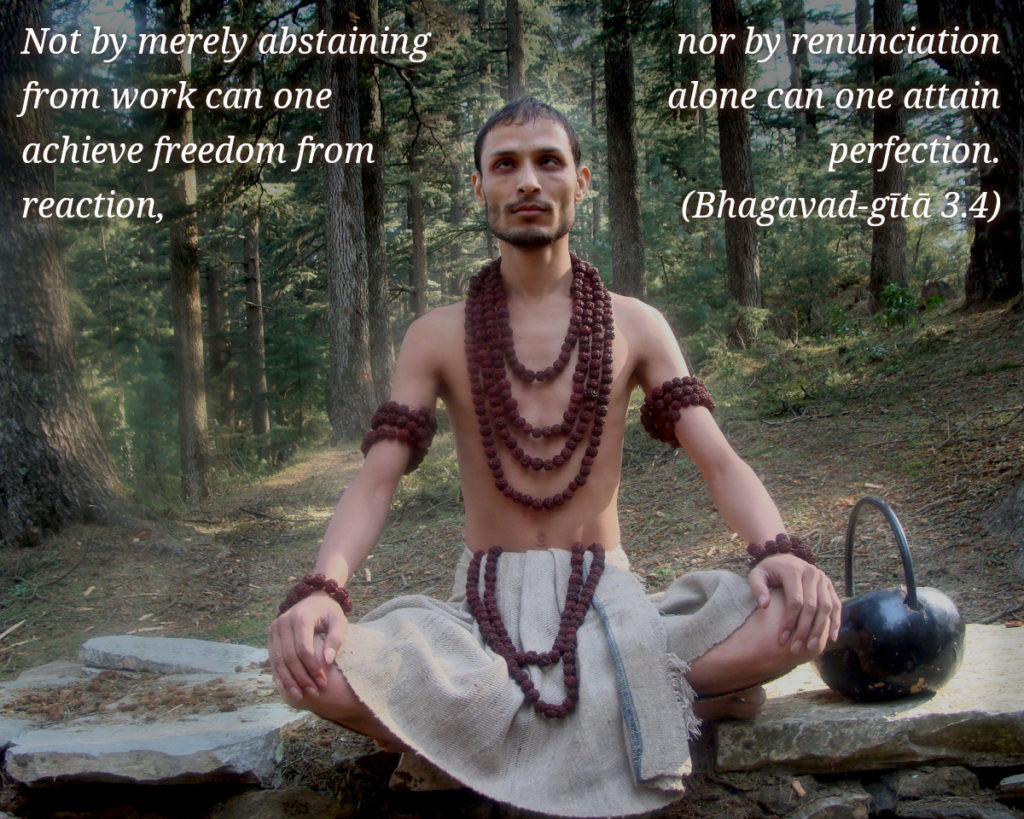न कर्मणामनारम्भान्नैष्कर्म्यं पुरुषोऽश्नुते |
न च संन्यसनादेव सिद्धिं समधिगच्छति || 4||
na karmaṇām anārambhān naiṣhkarmyaṁ puruṣho ’śhnute
na cha sannyasanād eva siddhiṁ samadhigachchhati
na—not; karmaṇām—of actions; anārambhāt—by abstaining from; naiṣhkarmyam—freedom from karmic reactions; puruṣhaḥ—a person; aśhnute—attains; na—not; cha—and; sannyasanāt—by renunciation; eva—only; siddhim—perfection; samadhigachchhati—attains
Translation:
Man does not match the actionless state of Brahman by mere non-performance of work, nor does he attain perfection by renunciation only.
Commentary:
The first line of the verse refers to Karma Yoga and the second line Jnana Yoga.
By simply declining to do the prescribed duties. man cannot reach the still, actionless of Brahman. In the same way, by merely adopting the external formalities of Sanyasa, no man can attain liberation. What is needed for perfection is the purity of mind.
Unless work is done without attachment there cannot be purity of mind; without purity knowledge of Atma will not dawn; without knowledge, there is no Moksha (liberation). Therefore the Lord here declares that there is no moksha for the man who does not work. In the beginning, all seekers should undertake some form of work and learn to do it without hankering after the fruits thereof. and in the final stages, they attain the experience of Self. No one gains Moksha by merely giving up work. lf that is so, the idlers would be the greatest philosophers of the world! On the other hand. such men fall deeper into the mire of tamas, and it would take many births for them to lift themselves up from the bog of inaction. Many ignorant people imagine that when they give up work, they simply attain Moksha, and on account of this misconception, lose worldly prosperity as much as spiritual progress. They are neither Karmayogis nor Jnanayogis. They are neither useful to the world nor to themselves, nor can they move an inch towards perfection. It is absolutely necessary to understand the position correctly.
The path of spiritual progress is slow and gradual. Sudden illumination never occurs except in very rare cases. Everyone should pass from tamas to rajas, from rajas to sattva, and from sattva to pure sattva when Self is realised. The first step is the performance of prescribed duties by so disciplining the body and mind that they take to action easily and naturally. Therefore the Lord here declares that the final experience of Brahman is not an easily attainable objective by merely giving up one’s duties. Work should be done, without attachment. That is the trumpet of the Lord. Moreover, it is utterly useless to renounce work while all the inherent tendencies of the mind and heart are actively and powerfully functioning in their own way without any check or control. Nothing good can come from mere external renunciation of action. The spiritual aim cannot be achieved by that.
The question is not whether to work or give up work. The main issue is how to get inner purity of mind and heart, how to eradicate the evil impulses and instincts which have taken root in the depths of the human personality. Towards this end, the Lord prescribed selfless work. He exhorts all men to undertake some form of good work and do it without any motive of gain or profit, and with a spirit of dedication to the Lord.
Swami Vivekananda Says —
Krishna strikes another note as a teacher of intense activity. Work, work, work day and night, says the Gita. You may ask, “Then, where is peace? If all through life I am to work like a cart-horse and die in harness, what am I here for?” Krishna says, “Yes, you will find peace. Flying from work is never the way to find peace.” Throw off your duties if you can, and go to the top of a mountain; even there the mind is going — whirling, whirling, whirling. Someone asked a sannyasin, “Sir, have you found a nice place? How many years have you been travelling in the Himalayas?” “For forty years,” replied the sannyasin. “There are so many beautiful spots to select from, and to settle down in: why did you not do so?” “Because for these forty years my mind would not allow me to do so.” We all say, “Let us find peace”; but the mind will not allow us to do so.[Source]
One must do some work. Through work alone can one remove the bondage of work, not by avoiding work. Total detachment comes later on. One should not be without work even for a moment.
(p.14-5, The Gospel Of Holy Mother, Mother’s advice to a devotee on 18 September 1912)
Isa Upanishad Verse 9, 10 & 11: Into a blind darkness they enter who are devoted to ignorance (rituals); but into a greater darkness they enter who engage in knowledge of a deity alone. One thing, they say, is obtained from knowledge; another, they say, from ignorance. Thus we have heard from the wise who have taught us this. He who is aware that both knowledge and ignorance should be pursued together, overcomes death through ignorance and obtains immortality through knowledge.
Question: What is the way to attain Moksha?
Answer: Moksha cannot be attained by non-performance of work or by external renunciation.
Question: How then can Moksha be attained?
Answer: By purifying the mind through nishkama karma, Moksha can be attained.
